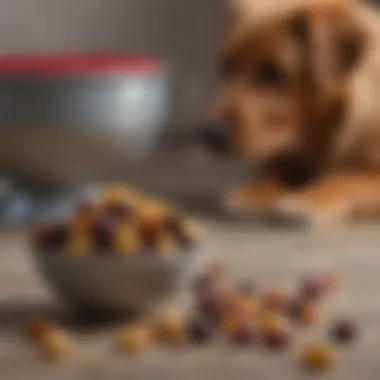Assessing the Risks of Feeding Raisins to Dogs


Intro
The topic of feeding raisins to dogs merits careful consideration due to the significant health risks involved. It is crucial for pet owners to understand not only the dangers associated with small amounts of raisins but also the physiological impact on dogs. While grapes and raisins may seem like harmless snacks from the human perspective, the reality is starkly different. Scientific evidence indicates that these foods can lead to acute kidney failure in dogs, a condition that poses severe threats to their well-being.
In this article, we will delve deep into the toxic effects of raisins, explore symptoms that can arise from ingestion, and discuss what steps to take in the event of accidental consumption. Additionally, we will present safer dietary alternatives for canine companions, ensuring pet owners are well-informed about the most suitable treat options available.
Understanding why certain foods can be harmful is essential in promoting effective dietary practices. Addressing these concerns will empower pet owners to make informed decisions and safeguard their pets from unnecessary health risks.
Preface to Pet Nutrition
Pet nutrition is a crucial aspect of responsible pet ownership, yet it is often overlooked. Understanding what constitutes a healthy diet for dogs enables pet owners to make informed decisions about their companion’s food. This knowledge not only enhances the quality of life for pets but also plays a significant role in preventing health issues over time.
One primary reason for focusing on dog nutrition is the increasing incidence of dietary-related health problems. Obesity, diabetes, and allergies are just a few examples of conditions that can arise from improper feeding habits. Thus, familiarizing oneself with the nutritional needs of dogs is essential.
Moreover, many pet owners might not realize that certain human foods can be dangerous, such as raisins. This highlights the need for awareness surrounding safe and unsafe food practices. By gaining insights into proper pet nutrition, owners can create a balanced diet that promotes optimal health and longevity for their pets. Besides reducing the likelihood of health risks, educated choices can lead to improved behavior and energy levels.
In this article, we will thoroughly explore the implications of feeding raisins to dogs. By understanding the risks along with potential signs of toxicity and safer dietary alternatives, readers will be better equipped to ensure their canine companions maintain a healthy lifestyle.
The Nature of Raisins and Grapes
Understanding the nature of raisins and grapes is critical for dog owners. This knowledge can guide caregivers in making informed dietary choices for their pets. The consumption of these fruits by dogs may appear harmless at first glance, but there are underlying risks that must be evaluated.
Raisins, which are dried grapes, retain many of the properties of their fresh counterparts. However, the drying process alters their composition, making them potentially dangerous for dogs. This section emphasizes the composition of raisins compared to grapes and explores the connection between the two, laying the groundwork for understanding why raisins pose particular toxicity risks.
Composition of Raisins
Raisins are created through the dehydration of grapes, leaving behind a condensed product that is flavorful and sweet. They consist mainly of sugars, fiber, and various vitamins and minerals. The primary nutrient in raisins is sugar, which can vary in concentration depending on the drying process. Common components found in raisins include:
- Natural sugars: Fructose and glucose are the major sugars present, accounting for a significant portion of raisin content.
- Vitamins: Raisins contain some B vitamins such as B6 and niacin, but these are present in small amounts.
- Minerals: They offer iron, potassium, and calcium; however, these are not in sufficient quantities to be the main source of nutrition for dogs.
- Antioxidants: Raisins contain antioxidants that may provide health benefits to humans, but it is unclear how these affect dogs.
Due to the high sugar content, feeding raisins to dogs can lead to various health concerns, especially for those predisposed to obesity or diabetes. Additionally, the lack of nutritional balance in raisins underscores the importance of providing dogs with a well-rounded diet that is safe and supportive of their overall health.
The Grapes-Raisins Connection
The relationship between grapes and raisins cannot be overlooked. Both are derived from the same fruit; however, the critical difference lies in their processing. Grapes have been documented to cause acute renal failure in dogs, making it imperative to understand how this connection extends to raisins.
- Toxicity Evidence: Research suggests that the exact component in grapes and raisins that triggers toxicity in dogs remains unknown. Some speculate that it may be linked to the concentration of certain phytochemicals present in grapes, which are intensified during the drying process.
- Individual Sensitivity: It is also important to note that not all dogs exhibit the same reactions to grapes or raisins. Some dogs may not experience toxicity, while others can suffer severe consequences from even small amounts.
- Potential Risk Factor: Even the smallest ingestion of raisins can lead to adverse effects, and owners should not take chances. Many cases of toxicity occur without prior history, further highlighting the need for caution.


Toxicity in Dogs
The discussion around toxicity in dogs is crucial for understanding how certain foods can affect our canine companions. The ingestion of items that are otherwise considered safe for humans can lead to unforeseen health risks for dogs. It is necessary to explore the underlying factors that contribute to toxicity levels in dogs and the specific hazards linked to particular foods like raisins.
Understanding Canine Toxicity
The concept of canine toxicity involves the study of substances that can cause adverse reactions in dogs. Different breeds and individual dogs can react differently to certain foods. Factors such as dosage, size, and overall health of the dog play significant roles in how a dog metabolizes a substance.
Toxicity can manifest in various forms, including lethargy, gastrointestinal upset, and, in serious cases, organ failure. Therefore, dog owners must be aware of potential toxic foods. In the case of raisins, there is no universally accepted threshold for what quantity is dangerous. Even a small amount can lead to severe consequences in some dogs. Understanding these risks allows owners to make informed decisions about their pets' diets, safeguarding their health and well-being.
Specific Risks Associated with Raisins
Raisins pose specific risks that warrant careful consideration. Studies indicate a troubling link between raisin ingestion and acute kidney injury in dogs, even when the exact reason for this reaction remains unclear. Some dogs can exhibit toxic effects after eating just a few raisins, while others appear unaffected after consuming larger amounts.
The following list outlines notable risks associated with giving raisins to dogs:
- Acute kidney failure: This is the most severe risk and can result from the ingestion of even a single raisin for some dogs.
- Gastrointestinal distress: Symptoms may include vomiting, diarrhea, or abdominal pain shortly after ingestion.
- Dehydration: This can occur due to vomiting and diarrhea, leading to potential secondary health issues.
It is vital to recognize that symptoms can vary widely among individual dogs, making it essential for pet owners to err on the side of caution and avoid feeding raisins entirely.
Symptoms of Raisin Toxicity
Understanding the symptoms of raisin toxicity is crucial for any dog owner. Elevating awareness about these signs can lead to prompt action, potentially reducing harm to pets. Not all dogs will react the same way to consumiing raisins, making it essential to recognize early indications of distress. Educating owners about these symptoms allows for quicker decisions regarding veterinary care and can significantly influence outcomes.
Early Warning Signs
The early warning signs of raisin toxicity can be subtle but should not be ignored. Some initial symptoms include:
- Vomiting: This is often the first noticeable symptom, occurring within hours of ingestion.
- Diarrhea: Another common gastrointestinal response, diarrhea may occur alongside vomiting.
- Lethargy: A noticeable decrease in energy or enthusiasm may signal discomfort or distress.
- Loss of Appetite: A refusal to eat can indicate that the dog is feeling unwell.
If a dog exhibits these symptoms soon after ingesting raisins, immediate assessment is necessary. Taking note of food intake and activity levels can aid in distinguishing normal behavior from concerning changes. For a better understanding, consider keeping a log of any unusual behaviors. It’s helpful to track these early signs for any veterinary consultation.
Severe Reactions to Watch For
Severe reactions can escalate quickly if a dog has ingested raisins. These reactions may develop within hours or days and can be life-threatening. Symptoms to monitor include:
- Abdominal Pain: Dogs may squirm, whine, or adopt unusual postures indicating discomfort.
- Increased Thirst and Urination: Signs of potential kidney failure can manifest through excessive drinking or urination.
- Weakness or Collapse: A sudden loss of strength or inability to stand can indicate a severe reaction.
- Tremors or Seizures: Neurological distress is critical and requires immediate attention.
Prompt response to these symptoms can save a dog's life. If any severe reactions are observed, seeking emergency veterinary assistance is critical.


Recognizing these severe symptoms can drastically affect the outcome for an affected dog. Keep in mind that even small amounts of raisins may trigger these reactions in some dogs, making vigilance paramount. Educating yourself on both early and severe symptoms lays the foundation for responsible pet ownership.
Immediate Actions After Ingestion
Understanding the immediate actions to take after a dog ingests raisins is crucial for every pet owner. Raisins can cause serious health issues in dogs, and timely action can significantly affect the outcome. Knowing how to assess the situation and when to seek emergency veterinary care is vital.
Assessing the Situation
When a dog consumes raisins, the first step is to assess the situation calmly. It is important to determine the quantity of raisins ingested. A small amount may not always lead to severe toxicity, but there is no definite safe limit. Additionally, consider the breed, size, and individual health status of the dog. Some dogs may experience rapid and severe reactions, while others may show delayed symptoms.
To effectively assess the scenario, take note of:
- The time of ingestion.
- The amount of raisins eaten.
- Any symptoms already manifesting, such as vomiting or lethargy.
If it is uncertain how many raisins were consumed, it is better to err on the side of caution. Avoid waiting for symptoms to develop; act promptly.
"Timely intervention is often critical in managing toxic ingestions in dogs."
Emergency Veterinary Care
Emergency veterinary care should be sought as soon as possible if a dog has ingested raisins. A veterinarian can conduct an assessment and may recommend immediate treatment options, such as inducing vomiting or administering activated charcoal to prevent absorption of the toxins. These actions must occur within a few hours after ingestion for effectiveness.
While waiting for veterinary help, keep an eye on the dog's condition. If vomiting occurs, make note of it, as this information will help the veterinarian make informed decisions about treatment. If the dog has difficulty breathing, exhibits seizures, or becomes unresponsive, this signifies a critical situation requiring immediate attention.
It is also wise to have the contact information of a local emergency veterinary clinic readily available. Familiarize yourself with their procedures in case of urgent scenarios. Ultimately, understanding the significance of quick, informed actions can save a dog's life and avoid severe health complications.
Alternatives to Raisins in Dog Diet
The discussion surrounding the dangers of raisins for dogs places significant emphasis on finding safer options for treats. Many pet owners are often unaware of the array of alternative snacks that are both nutritious and enjoyable for their canine companions. Identifying alternatives to raisins is essential not only to avoid potential toxicity but also to ensure that your dog receives a balanced diet rich in vitamins and minerals. This section will delve into safe fruits for dogs as well as nutritious commercial treats.
Safe Fruits for Dogs
Not all fruits are harmful to dogs. In fact, many fruits can be a healthy addition to a dog’s diet. When considering which fruits to offer, you should keep in mind the safety and nutritional value. Some of the safest fruits include:
- Apples: Rich in vitamins A and C. Remove the seeds and core before feeding to your dog.
- Blueberries: Packed with antioxidants, these small berries are a great low-calorie treat.
- Bananas: Moderately high in sugar, so they should be offered in moderation.
- Watermelon: Hydrating and low in calories. Make sure to remove seeds and rind.
- Strawberries: Contain antioxidants and can help improve your dog’s dental health.
When introducing any new fruit into your dog’s diet, it is a good idea to start with small amounts. Watch for any adverse reactions or digestive issues.
Nutritious Commercial Treats


Aside from fresh fruits, there are numerous commercial treats specially formulated for dogs. These treats often provide essential nutrients that might be lacking in homemade diets. When choosing commercial options, consider the following:
- Look for high-quality ingredients: Brands like Wellness, Blue Buffalo, and Greenies offer a range of nutritious options.
- Check for certifications: Products should meet standards set by regulatory bodies.
- Avoid artificial additives: Treats without fillers or excessive sugar are preferable.
Commercial treats can cater to various dietary needs, such as grain-free or high-protein diets. Always consult with your veterinarian to identify the best options for your pet’s specific health requirements.
"Choosing safe and nutritious alternatives helps ensure your dog's health and enjoyment."
Educational Resources for Dog Owners
Understanding the risks associated with feeding raisins to dogs necessitates access to reliable educational resources. This article has covered the severe health implications of raisin consumption, yet knowledge does not stop here. Continual learning is essential for all pet owners who navigate the complex landscape of canine nutrition and health. The availability of informative resources can help ensure informed decisions and safe feeding practices.
Among these resources, guidance from professionals should be a top priority. Accessing reputable veterinary advice can clarify misconceptions. Each dog may react differently to certain foods, and a veterinarian can provide tailored insights based on individual health conditions and histories.
Veterinarian Guidance
Veterinarians are vital sources of knowledge regarding pet care. They offer insights on numerous subjects, including the dangers associated with specific foods like raisins. A veterinarian’s expertise extends beyond just the general knowledge of pet nutrition. They can assess a dog’s unique dietary needs, taking into account factors such as age, weight, and pre-existing health conditions.
Moreover, seeking veterinary guidance helps build a collaborative relationship with the pet's healthcare provider. Regular consultations can keep pet owners informed about new findings related to dog diets. This proactive approach ensures dogs maintain a balanced diet, avoiding harmful foods.
Having access to accurate information from a veterinarian means pet owners can avoid relying solely on anecdotal evidence from less reliable sources. This distinction is crucial, especially when dealing with potentially dangerous foods.
Online Communities and Websites
In addition to direct veterinary guidance, online communities offer another valuable resource for dog owners. Websites like Reddit or dedicated pet care forums provide platforms for sharing experiences. These resources enable pet owners to connect with others who may have faced similar challenges. They allow the exchange of tips and experiences about keeping dogs safe and healthy.
However, while these platforms are helpful, it is important to exercise caution. The information shared may not always come from knowledgeable sources. Therefore, it is advisable to corroborate any findings with credible, scientific viewpoints.
Websites such as en.wikipedia.org or britannica.com can serve as foundations for more in-depth knowledge. They cover a broad range of topics regarding canine health. Engaging with these resources assists dog owners in staying informed about not only raisins but a variety of other foods that could pose risks.
By employing these educational resources thoughtfully, dog owners can navigate the complexities of appropriate canine nutrition. This diligence can lead to healthier and happier lives for their furry companions.
End
Understanding the risks associated with feeding raisins to dogs is crucial for all pet owners. This article has outlined various aspects of raisin toxicity, providing insights into why this common snack can pose a serious threat to canine health.
Recap of Key Points
- Toxic Nature: Raisins and grapes have been established as toxic to dogs. The exact mechanism of toxicity remains unclear, though even small quantities can lead to severe health issues.
- Symptoms of Ingestion: Awareness of the symptoms of raisin toxicity is essential. Early signs may include vomiting, lethargy, or abdominal pain, while more severe reactions can escalate to kidney failure.
- Response Protocol: Immediate action is vital after ingestion. Assessing the situation and seeking emergency veterinary care can potentially save a dog from fatal outcomes.
- Alternatives: The article suggests safe fruit options and nutritious commercial treats, ensuring pet owners have healthy choices available that will not harm their pets.
- Educational Resources: Engaging with veterinarians and reputable online communities can provide ongoing support for responsible pet care decisions.
A Call for Responsible Pet Care
Pet owners hold a significant responsibility to ensure the safety and well-being of their dogs. Recognizing the dangers of feeding raisins is just one element of comprehensive pet care.
- Educate Yourself: Stay informed about safe feeding practices. Knowing which foods are harmful can prevent accidental poisoning.
- Communicate with Professionals: Regular consultations with veterinarians can guide pet owners on proper nutrition and health management.
- List of Safe Foods: Always maintain a list of dog-safe foods. This can help in avoiding potentially dangerous snacks that may be overlooked.







